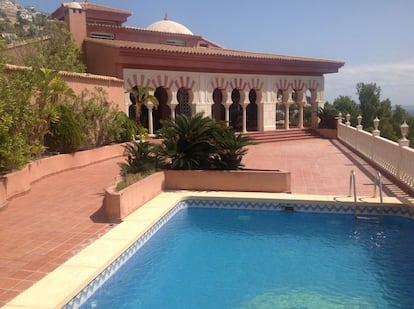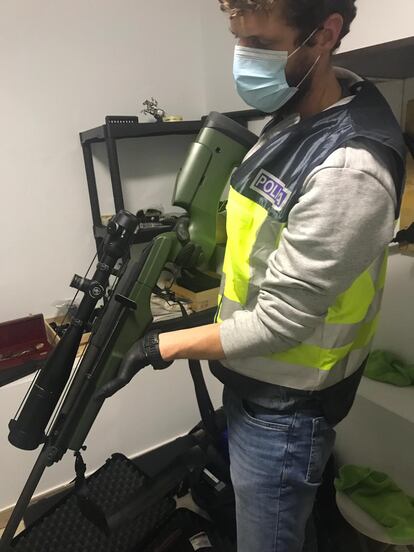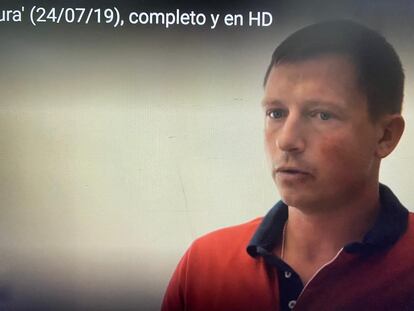Spanish police bust Russian mafia network operating on Mediterranean coast
More than 20 suspects, including city councilors and Civil Guard officers, were arrested in Alicante province and Ibiza for their involvement with Alexei Sirokov


Alexei Sirokov was not overly surprised when the National Police entered his mansion in Altea Hills, in Spain’s Mediterranean province of Alicante, to handcuff him and his wife. Only a few months ago, he had received the news that the country’s Central Brigade for Organized Crime (UDYCO) was about to arrest him. But he had heard that before, so it was business as usual for this Russian-born lawyer in his 50s, who was schooled by the Jesuits and graduated in law from the University of Alicante. He carried on with his real estate and business consulting activities from inside the high-security and luxury residential development, which has been dubbed the “Russian Eden,” and which, according to police sources, is home to 25% of Russians living in Spain.

But this time it was for real; the arrest of Sirokov and another 22 people on December 14 wrapped up a seven-year investigation called Operation Testudo. Most of those arrested were Russian entrepreneurs as well as their advisors and business partners. But the operation also caught a police officer and two Civil Guard officers, two city councilors for security issues, civil servants working in urban planning, and several Spanish lawyers who acted as frontmen. All the members of this alleged “network of patronage” were later released on bail, except Sirokov and his three main partners, who went straight to prison.
With Sirokov’s arrest, police sources say an entire Russian empire built along the Mediterranean coast and the Balearic island of Ibiza in the form of luxury homes, hotels, nightclubs and upscale restaurants has been brought down.
Sirokov is considered something of a philanthropist and, according to one investigator, made generous donations to good causes. He has two small children and is a pillar of the Orthodox Church that overlooks Altea Hills outside Altea, in Alicante province. He even appeared on television last year, speaking about the opulent lifestyle enjoyed by Russians in Alicante on the program Fuera de Cobertura (Or Out of Range). But behind the scenes, he was also becoming the king of money laundering.
Last week, Sirokov was imprisoned along with his two partners and a Russian business magnate whose companies were allegedly used by the Russian mafia to invest their ill-gotten gains – profits from arms deals and drug trafficking and also, according to the investigation, from the enforced privatization of public companies and strategic sectors monopolized by oligarchs in the former Soviet Union.

Dangerous liaisons
“Some of the arrested public workers described themselves as Sirokov’s friends,” says one investigator. “They were not aware that the favors they did for him implicated them in a criminal organization.” This was not, however, the case of the police inspector for immigration who facilitated documentation and residence permits for Sirokov; nor the case of the Civil Guard officers in Altea and Benidorm who made the network members’ lives easier, because Altea Hills falls under the purview of the Civil Guard, said the same sources.
The arrested public officials “gave them access to information and eased conditions for property developments on land where they wanted to build,” said police sources. “That’s why there is also the odd urban planner among those arrested,” they explain.
Operation Testudo is said to be the most important operation against Eastern European and Russian mafia organizations in the last 10 years. But Alexei Sirokov’s name had been cropping up in police inquiries long before that, though no link was ever established between him and Russian organized crime. “He had the profile of a trustworthy person,” say investigators, who explain that as a Russian raised and educated in Spain, Sirokov “was the perfect key to opening the doors [that the mafia] needed to invest their money.”
But after a seven-year investigation, which was interrupted on more than one occasion for several months, police have been able to trace all the dubious millions invested by Russian businessmen in Spain back to Sirokov and his partners.
Operation Testudo is said to be the most important operation against Eastern European and Russian mafia organizations in the last 10 years
Sirokov’s strategy was simple. First, Russian businessmen would come to Spain for a holiday in Ibiza or Alicante. Then, they started to extend their stays until finally, they were investing their money. “For example, they tried to buy the name rights to the Space nightclub in Ibiza and the Ushuaïa Ibiza Beach hotel from businessman Abel Matutes; they were always looking for luxury,” says one investigator.
During the 18 raids carried out by the organized crime unit, officers found €300,000 in cash hidden in safety boxes as well as €1 million in one of the frozen accounts. They also came across six small firearms, two combat shotguns, an assault rifle, a sniper rifle with a silencer and thousands of cartridges of different calibers, some of them in Sirokov’s possession. Sirokov only has a gun license for Olympic shooting.
Police also seized cryptocurrency accounts, diamonds and 16 luxury vehicles, and froze millions of euros worth of assets. The investigators were also able to prove that all the entrepreneurs “advised” by Alexei Sirokov and his partners had accounts and safe deposit boxes in the same bank in Altea, where the investigation is ongoing.
English version by Heather Galloway.
Tu suscripción se está usando en otro dispositivo
¿Quieres añadir otro usuario a tu suscripción?
Si continúas leyendo en este dispositivo, no se podrá leer en el otro.
FlechaTu suscripción se está usando en otro dispositivo y solo puedes acceder a EL PAÍS desde un dispositivo a la vez.
Si quieres compartir tu cuenta, cambia tu suscripción a la modalidad Premium, así podrás añadir otro usuario. Cada uno accederá con su propia cuenta de email, lo que os permitirá personalizar vuestra experiencia en EL PAÍS.
¿Tienes una suscripción de empresa? Accede aquí para contratar más cuentas.
En el caso de no saber quién está usando tu cuenta, te recomendamos cambiar tu contraseña aquí.
Si decides continuar compartiendo tu cuenta, este mensaje se mostrará en tu dispositivo y en el de la otra persona que está usando tu cuenta de forma indefinida, afectando a tu experiencia de lectura. Puedes consultar aquí los términos y condiciones de la suscripción digital.








































